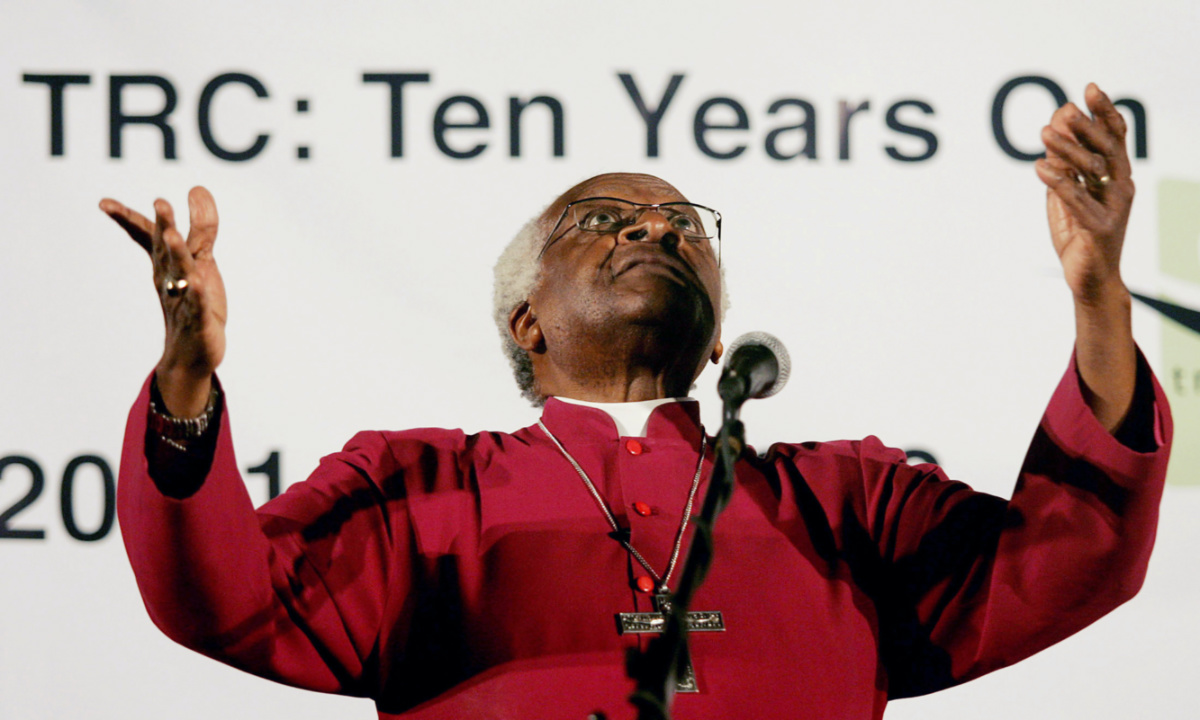
Desmond Tutu biographer MICHAEL BATTLE, in an article published on Religion News Service, looks at the life and legacy of the South African activist and archbishop…
Via RNS
While writing my biography of Archbishop Desmond Tutu, I sought to answer whether his work made him a saint or a politician. This may seem a curious question to those who know Tutu as a cleric who demanded an end to South Africa’s apartheid system, and then led a Truth and Reconciliation Commission to heal the country in its wake.
But to most whites in South Africa at the time, Tutu was an ogre. He was often accused of being a politician, wielding worldly power, trying hard to look like a bishop. (Tutu answered this charge with humour: “I manage with consummate skill to hide my horns under my funny Bishop’s hat,” he once said, “and my tail tucked way under my trailing cope.”)

Former Truth And Reconciliation Commissioner Anglican Archbishop Emeritus Desmond Tutu gestures, during a public debate on the legacy of the TRC in Cape Town, South Africa, on 20th April, 2006. Tutu died on 26th December, 2021, at the age of 90. PICTURE: AP Photo/Obed Zilwa/File photo.
My eventual conclusion was that he is a saint. There are many reasons for this argument – most of which were revealed to me in the time I was blessed to live with him in 1993 and 1994.
In that time, I discovered that he believes deeply in God and that he experienced God’s presence in awe – a wordless, imageless encounter with the divine (to go with the Anglican Book of Common Prayer’s wordy approach).
“My eventual conclusion was that he is a saint. There are many reasons for this argument – most of which were revealed to me in the time I was blessed to live with him in 1993 and 1994.”
The former way of prayer – known as “apophatic” prayer – is more popular today, as many of us want to move beyond language, ideas and dogma. The apophatic tradition is about letting God empty us of ourselves and instead fill us with God’s fullness so that we become more and more Godlike.
Living with Tutu, however, made me realise that we also need words to pray and to know God.
Tutu helped me understand how the particular is helpful in the spiritual life. As Jesus said in the Gospel of Luke, the very hairs of our heads are numbered, and we are known by name by this God, for whom not even a sparrow can fall to the ground without God noting it.
As I heard Tutu preach at political funerals or speak truth to power, he showed me that words also matter to God. This was tremendous news to those who are downtrodden and oppressed. They can discover through words that they indeed matter enormously to this God, that they have infinite worth in God’s sight, for they were created in God’s image.
The idea of particularity becomes revolutionary material where there is injustice and oppression. I heard Tutu tell those who had been treated as if they did not count that they matter – that nothing anybody else does to them can alter the most fundamental fact about them: that God loves them.
I saw, too, through my days with Tutu how spirituality and politics worked together in his work with the Truth and Reconciliation Commission. The commission moved with the clarity of communal vision, seeing even in past atrocities the potential of liberation for everyone. Communal spirituality helps us see that no-one is fully free until all are free.
We rely on our readers to fund Sight's work - become a financial supporter today!
For more information, head to our Subscriber's page.
The truth is that Tutu showed that the question of saint or politician is a false dichotomy. The work of both is to give us all an understanding that exclusivism is evil. Tutu’s genius was to recognise that spirituality and politics are closely aligned, because when facing God, we are forced to face our neighbour.
The symbiosis of spirituality and politics is the movement from oppression to a promised land. This thoroughly Biblical concept, however, leaves us vulnerable to perceiving ourselves alone as a chosen people. It is actually a dangerous thing to be God’s favourite.
Christians and white people run the risk of the heresy of supersessionism when they see themselves as chosen. Apartheid was de facto a religious worldview, and it’s through that lens that white South Africans saw their 1838 victory over the Zulu at Blood River and their dominance of South Africa as God’s blessing. Advocates of apartheid theology saw themselves as special in an exclusive way, making others inferior who were not of the chosen people.
Tutu, using both words and silence, guarded against the problem of insular spiritualities on the one hand and, on the other, politics that falls victim to fanaticism and delusion.
Tutu’s words and silence help us understand that we cannot allow patterns of exclusion to continue. We must be brave enough not to allow any constituency to hold us hostage, preventing us from making the compromises necessary for the flourishing of a new Heaven and a new Earth. Any healthy spirituality or politics must embrace that everyone of us is a person of immense value, because each one of us is created in the image of God.

Michael Battle is the Herbert Thompson Professor of Church and Society and director of the Desmond Tutu Center at General Theological Seminary. He is the author of Desmond Tutu: A Spiritual Biography of South Africa’s Confessor.
This article contains affiliate links.





